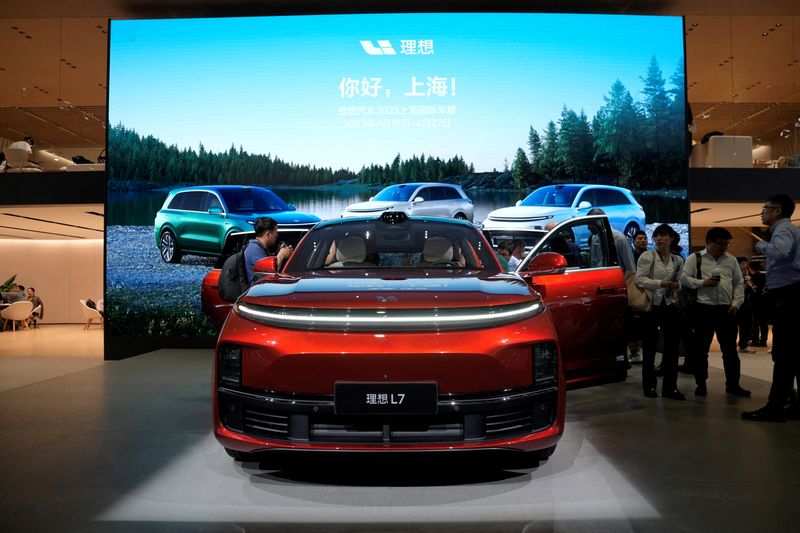SHANGHAI (Reuters) - As EV makers in China wage an intense price war to prop up slowing demand, Chinese brands with strong hybrid lineups are emerging as winners, attracting consumers with vehicles with long range that can cost less than gasoline cars.
The emerging trend may provide a glimmer of hope for global automakers such as Toyota (NYSE:TM) and Honda (NYSE:HMC) who are pursuing "multi-pronged" electrification strategies, as electric vehicle (EV) sales lose momentum in Europe and the U.S., partly because of high auto financing costs.
One-third of total vehicle sales by Toyota, the world's top-selling automaker, are already hybrids and the company reported a 34% surge in hybrid sales in the six months to end-September, outpacing 9% growth in overall revenue.
Experts warn that foreign brands now face a growing threat from Chinese rivals that have conquered the domestic hybrid market and are looking overseas, emboldened by their strength as the world's lowest-cost EV producer after heavy investment in supply chains.
In the United States, most hybrid powertrains sell at a $1,500 to $2,000 premium to combustion models, but in China, some hybrids are offered at a slight discount to gasoline models and can be as much as 23% cheaper than pure EVs.
That price advantage is driving Chinese consumers to hybrid models, which work almost like pure EVs when they are used for short daily commutes, consuming little gasoline, analysts said.
"People are increasingly accepting that a car can be equipped with both an electric motor and a gasoline engine, as they are highly complementary," said Xu Min, a professor at Shanghai Jiao Tong University's Institute of Intelligent Vehicle. "Wherever the gasoline engine is low in efficiency, we can make up for it with the electric motor."
Two types of hybrids – plug-in hybrid (PHEV) and extended-range hybrid (EREV) - are enjoying strong demand, with their combined shipments surging 85% and outpacing a 14% growth in pure electric car sales this year, industry data showed.
The popularity of these hybrids is so strong that the segment is now half as big as the pure EV market and accounts for 12% of total passenger vehicle sales, according to data from China Association of Automobile Manufacturers (CAAM).
Li Auto (NASDAQ:LI), the most popular extended-range hybrid seller in China, has thousands of customers waiting for delivery of its new large SUVs, a stark contrast with many other brands grappling with an unsold inventory buildup.
"The extended-range hybrids are the best option for Chinese drivers who want ... a solution to driving range anxiety, better fuel efficiency, smarter driving features and lower prices," said Yale Zhang, managing director at the consultancy Automotive Foresight.
In the PHEV market, BYD (SZ:002594) has cemented its position as the most dominant player, with eight of the 10 top-selling plug-in hybrid cars in China among its offerings.
A PHEV can be driven directly by the electric motor or the gasoline engine. An EREV has a larger battery pack and runs on electricity only, with its gasoline engine serving as a power bank to recharge the batteries when they run low.
CHINA THREAT
The growing popularity of PHEVs and EREVs from Chinese firms, which dominated the top 10 best-selling EREV or PHEV models, have not only affected sales of gasoline cars but also gasoline hybrid vehicles (HEV), a segment Toyota pioneered with the Prius in late 1990s.
Sales of HEVs in China, which Toyota still dominates with four top-selling models, tumbled 15%, while gasoline car sales dropped 11%, underscoring potential challenges facing foreign automakers.
HEVs use gasoline for the main powertrain and come with a relatively small battery pack that is recharged during braking and used for auxiliary power. The sales slump for that type in China is partly a result of from government policy, which favours battery-driven hybrids by offering tax cuts for EVs, PHEVs and EREVs.
A foreign automaker was the first to crack the EREV market in China, only to cede it to local rivals: in 2017, General Motors (NYSE:GM) launched the Buick Velite 5 as the first extended-range hybrid in China, two years before Li Auto started volume production.
But it was a failed trial, with sales of just over 4,000 units, and GM in 2020 halted sales. By contrast, Li Auto sold 244,225 EREVs in the first nine months of 2023.
The struggle of the likes of GM and Toyota is a stark reminder of growing threats posed by Chinese rivals now looking to export markets for growth.
BYD is expanding PHEV sales overseas, offering Han, Qin and Song lineups in Latin America, which has less charging infrastructure.
Stellantis (NYSE:STLA) is investing $1.6 billion in Leapmotor (HK:9863) and is interested in bringing the Chinese partner’s EREV hybrids to Europe, according to people with knowledge of the matter.
Stellantis told Reuters it does not exclude the possibility of cooperation with Leapmotor on new energy technology products. Leapmotor did not respond to a request for comment.
Xu at Jiao Tong University, however, noted that the difference in driver demands across markets could affect demand for Chinese cars.
In North America, for example, consumers would look for cars with bigger horsepower to tow trailers, enabling a bigger popularity for HEVs.

Still some are sceptical of the HEV's longer-term future.
"Conventional hybrid (HEV) is breathing life into a dying patient - the gasoline engine," said Bill Russo, CEO of Shanghai-based advisory firm Automobility.